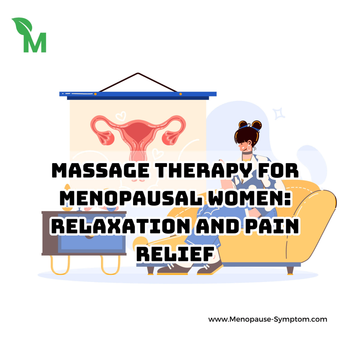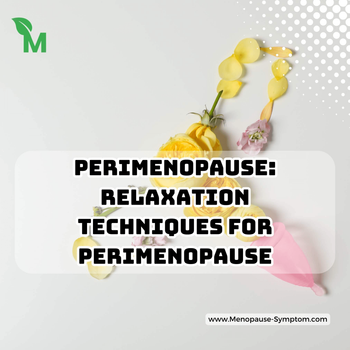Learn About Menopause
Menopause is a natural stage in a woman's life that marks the end of her menstrual cycle and fertility. It usually occurs between the ages of 45 and 55, but the exact timing can vary from person to person. During menopause, many women experience unpleasant symptoms such as hot flashes, night sweats, and anxiety. One of the most common problems is sleep disturbance, which increases stress and affects the quality of daily life. Finding a sleep aid during this stage becomes especially important.
Some common symptoms during this period:
Menstrual disorders:
Irregular menstrual cycles, which can be prolonged or shortened.
The amount of menstrual blood changes, which can be more or less than normal.
Hot flashes:
Sudden feeling of heat in the face, neck, chest spreading throughout the body, often accompanied by red skin, night sweats.
There may be chills immediately after the hot flash.
Other problems:
Headache, fatigue.
Weight gain, difficulty losing weight.
Rapid heartbeat, palpitations.
Osteoporosis, increased risk of fractures.
The Important Role of Magnesium in the Body
Magnesium is an essential mineral that plays an important role in many physiological processes in the body, including:
· Nerve function: Magnesium helps regulate nerve activity, improve sleep, reduce stress and anxiety.
· Muscle function: Magnesium is involved in muscle contraction and relaxation, helping to reduce muscle cramps and fatigue.
· Cardiovascular health: Magnesium helps stabilize heart rate, lower blood pressure and reduce the risk of cardiovascular disease.
· Bone health: Magnesium increases bone mineral density, strengthens bones and reduces the risk of osteoporosis.
· Energy metabolism: Magnesium is involved in the conversion of glucose into energy, supporting metabolism.
Sleep and menopause
Frequently interrupted sleep during menopause is one of the most complex problems that many women face. Hormonal changes lead to changes in body temperature, increased anxiety and stress. All of these things affect your ability to sleep well and rest properly. Research shows that magnesium supplementation can help improve sleep by calming the nervous system, reducing stress, and promoting relaxation.
The effects of not getting enough sleep include:
Weakened immunity: If you often catch the flu, your sleep problems may be to blame. Chronic sleep deprivation can disrupt your immune system, leaving you less able to fight off germs. Sleep deprivation reduces the activity of natural killer cells, and increases your risk of colorectal cancer by 36%.
Causes psychological and mental disorders: Not getting a night's sleep can leave you feeling moody and irritable the next day, so it's no surprise that chronic sleep deprivation can lead to mental disorders like depression and anxiety. Sleep deprivation also increases your risk of dementia by 33%.
Increased risk of cardiovascular disease: Chronic sleep deprivation is associated with increased heart rate, increased blood pressure, and increased levels of inflammatory substances – which puts a strain on your heart. Sleep deprivation increases your risk of cardiovascular disease by 48%.
Magnesium supplements for sleep
To enjoy deeper, more restful sleep during menopause, magnesium supplementation is a natural and effective method. Magnesium can be found in many foods such as seeds, beans, green vegetables, and nuts. In addition, many women choose to supplement magnesium through functional foods. This can help the body provide enough magnesium needed to support sleep and reduce other unpleasant symptoms of menopause.
Magnesium-rich foods
To supplement enough magnesium for the body, you should regularly add magnesium-rich foods to your daily diet. Here are some foods rich in magnesium:
· Nuts: Almonds, walnuts, pumpkin seeds, cashews.
· Beans: Black beans, kidney beans, green beans, soybeans.
· Seafood: Salmon, tuna, shrimp.
· Green leafy vegetables: Spinach, kale, broccoli.
· Fruits: Bananas, avocados, avocados.
· Dairy products: Milk, yogurt.
· Whole grains: Brown rice, oats.
Notes when supplementing magnesium
· Dosage: Consult your doctor to know the appropriate dose of magnesium for you.
· Drug interactions: Magnesium can interact with some medications, so inform your doctor about the medications you are taking.
· Health conditions: People with kidney failure or heart problems should be cautious when supplementing magnesium.
Other health benefits of magnesium
In addition to improving sleep, magnesium also brings many other health benefits for women during menopause. Magnesium has the ability to reduce symptoms of perimenopause and menopause such as pain, anxiety, and PMS. It also helps improve heart health, reducing the risk of cardiovascular disease during menopause. Women who supplement enough magnesium will feel more active and can easily cope with changes in daily life.
Conclusion
Menopause is a difficult time, but it doesn’t have to be a miserable time. Magnesium can be an effective sleep aid and health booster. By paying attention to your diet and supplementing with magnesium, you can enjoy better sleep and feel more comfortable during menopause. Start your self-care journey today for a healthier and happier life.
Tips
Some simple tips for increasing magnesium include:
· Eat more magnesium-rich foods: Add beans, nuts, and green vegetables to your daily diet.
· Practice relaxation exercises: Yoga and meditation can help improve relaxation and sleep.
· Take a magnesium supplement if needed: Be sure to consult your doctor before starting any supplement regimen.
Source: Team MPS compiled, analyzed and wrote. Please dont reup without source. Many thanks.

Massage Therapy For Menopausal Women: Relaxation And Pain Relief
10.07.2024
Pressure and stress in life are the cause of many health problems, especially in women in perimenopause.

Perimenopause And Your Home: Creating A Relaxing Oasis
10.07.2024
Perimenopause is a time of major change in a woman's life. As she enters this stage, her body undergoes many changes, from hormonal changes to health and emotions.

Perimenopause: Relaxation Techniques for Perimenopause
09.02.2024
Every stage of life brings new challenges and opportunities. Perimenopause and menopause are no exception, as this is a time when women often experience many changes both physically and mentally.
